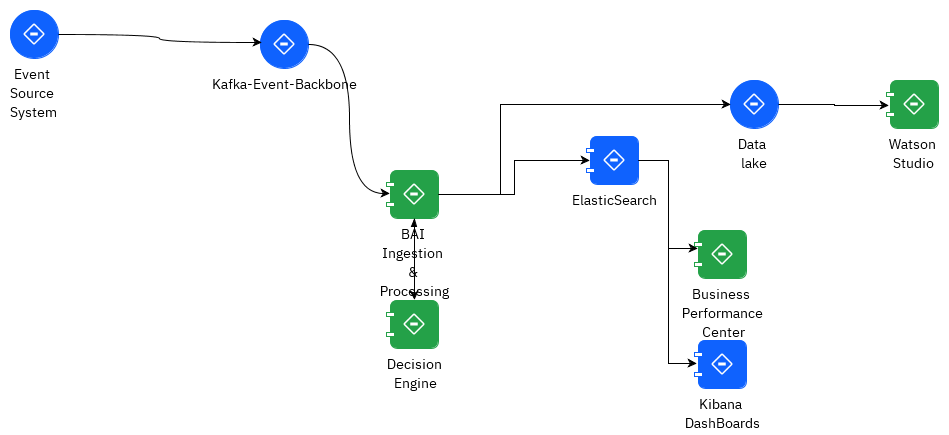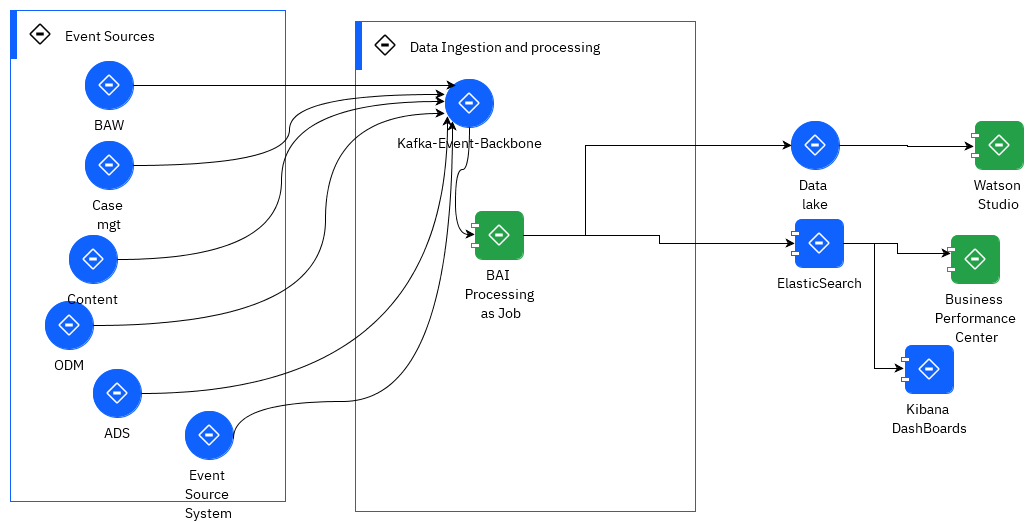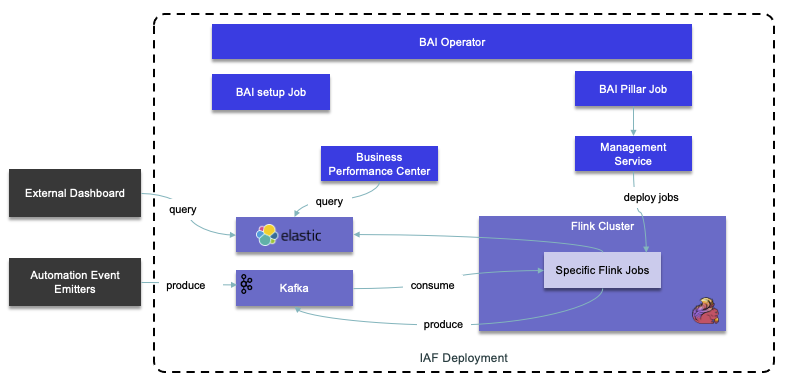Business Automation Insight -> Self driving enterprise¶
Goal: BAI processes event data (from IBM Business automation products) so that you can derive insights into the performance of your business.
It will be the foundation for self driving enterprise.
Value propositions¶
- AI continuously listen to events to correlate and derive business context to actionable insight in real time
- Deliver visibility, apply analytics or machine learning algorithms that add intelligence to the platform and provide guidance to knowledge workers and business owners.
- Detect: the insights engine builds a 360° view of the business to correlate events in-context, derives insights by applying analytics and detect business-relevant situations by applying rules, CEP and ML.
- Business owners keep control when automation fails
- Able to fully explain and account for its observations, correlations and actions
- Self-driving automation leapfrog traditional automation of tasks and workflow, by triggering actions based on insights and their impact on objectives and KPIs and automates across Business and IT silos
Features¶
- Ingest and process records from Kafka, store to Elastic Search
- Unify on single event framework for Automation and AI.
- Aggregate these events into business-relevant KPIs
- Monitoring with Kibana dashboards: Kibana uses index patterns to search indexes defined within Elasticsearch. An index pattern can match the name of a single index, or include a wildcard (*) to match multiple indexes
- Store events to data lake like HDFS for off line queries
- Business Performance Center to visualize your data and monitor business performance
- Add anonymization rules to secure sensitive data
Use cases¶
- Apply analytics with Brunel library to get insights on the decisions done in ODM, for example on loan origination, and the variables used to do eligibility.
- How to take better benefit of BPM process execution data and inject Machine Learning techniques to predict the duration of BPMN processes, based on the data captured by the process
Architecture¶
The features above are supported by different components as illustrated below:

Event Source systems will be Business Automation products.
Looking at the components, the BAI processing is based on Flink jobs: The distribution includes a set of jars for each supported event source.

The BAI operators creates a set up jobs to configure Elastic search and Kibana dashboard for Automation components like BAW, BPMN, ICM, Content.

Elasticsearch and kafka are deployed with IAF automation base. Flink cluster is defined with IAF Event Processor and BAI operator
The Kubernetes jobs are here to create resources like Flink cluster, and for each job, like the BPMN job, contains the jars file for Flink job. The Flink jobs are specifics for each component event processing needs.
The management service is the facade for to submit Flink job.
There is a generic Flink job, call the event-forwarder to process events from kafka and send telemetries to elasticsearch.
Event Sources¶
Sources of events for BAI are any of:
- Components of the IBM Cloud Pak for Business Automation platform
- Any Kafka records in Kafka Topics
- Supports BPM events to monitor the lifecycles of processes and activities, looped activities, tasks, gateways, timers, messages, and tracking groups. Aggregation of process time series, or from the business data
- Most of the older DBA products sent events in a predefined format, while ADS, Workforce Insight or custom event source uses Avro Schema.
High Availability¶
Getting started¶
It is possible to run BAI on linux or mac laptop, but the main deployment is on OpenShift.
On mac¶
See the product documentation for MacOS deployment
We need to get the images from Passport Advantage searching 'business automation insight', to get a zip named CP4Auto_20.0.3-bai4s.tgz. Unzip and start the bai-start --acceptLicense with --init for the first time to get certificates and users set up. The error message about port numbers not set for any of the services started by docker compose is due to not executing the .env. The questions asked help to populate this .env file.
The env file needs to be modified to export all the env variables declared, as docker-compose will not see them if not exported
bai-for-server/bai-flink:20.0.3 6123/tcp, 8081/tcp data_processors-deployer_1
bai-for-server/bai-admin:20.0.3 0.0.0.0:6892->6892/tcp data_admin_1
confluentinc/cp-schema-registry:5.5.1 8081/tcp, 0.0.0.0:8084->8084/tcp data_schema-registry_1
bai-for-server/bai-setup:20.0.3 data_setup_1
confluentinc/cp-kafka:5.5.1 9092/tcp, 0.0.0.0:29092->29092/tcp data_kafka_1
bai-for-server/bai-flink-taskmanager:20.0.3 6123/tcp, 8081/tcp data_taskmanager_1
bai-for-server/bai-monitoring-app:20.0.3 9080/tcp, 0.0.0.0:9443->9443/tcp data_business-performance-center_1
bai-for-server/bai-kibana:20.0.3 0.0.0.0:5601->5601/tcp data_kibana_1
bai-for-server/bai-flink:20.0.3 6123/tcp, 8081/tcp data_jobmanager_1
bai-for-server/bai-elasticsearch:20.0.3 9200/tcp, 9300/tcp data_elasticsearch_1
bai-for-server/bai-management:20.0.3 data_management_1
confluentinc/cp-zookeeper:5.5.1 2181/tcp, 2888/tcp, 0.0.0.0:2121->2121/tcp, 3888/tcp data_zookeeper_1
On ROKS¶
Documentation
Some capabilities to remember:
- Multiple installations of the Cloud Pak are supported, but each deployment must be installed in a different namespace and the operator needs to be installed for each namespace
- Install an instance of Lightweight Directory Access Protocol (LDAP) for your intended deployment. Not necessary for BAI.
The questionnaire to assess before installation
Starting with 21.0.2, BAI is part of Automation Foundation.
- You sould use a custom deployment for the AutomationBase resource to control your Kafka and ElasticSearch deployment.
-
Define data permission access for Business Performance Center
-
Create PVCs for storage and logs
# in ibm-cp-automation/inventory/cp4aOperatorSdk/files/deploy/crs/cert-kubernetes/descriptors
# update with the storage classes (file) to use in operator-shared-pvc.yaml
oc apply -f operator-shared-pvc.yaml